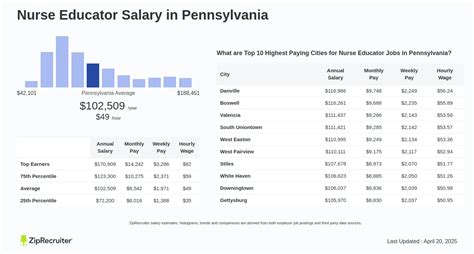For experienced Physician Assistants (PAs) seeking to shape the next generation of healthcare providers, a career in academia is a rewarding and influential path. Transitioning from a clinical role to that of a PA educator combines a passion for medicine with the profound impact of mentorship. But beyond the intrinsic rewards, what is the financial outlook for this specialized profession?
A career as a PA educator offers competitive earning potential, with salaries often ranging from $95,000 to well over $160,000 annually, depending on a variety of key factors. This article provides a comprehensive analysis of PA educator salaries, the factors that influence them, and the bright job outlook for this essential role.
What Does a PA Educator Do?

A Physician Assistant (PA) educator is a certified PA who works as a faculty member within an accredited PA program at a college, university, or academic medical center. They are the cornerstone of PA training, responsible for preparing students for the rigors of a clinical career.
Key responsibilities include:
- Curriculum Development: Designing and updating coursework to reflect the latest in medical practice.
- Didactic Instruction: Delivering lectures, leading discussions, and running lab sessions on subjects from anatomy and pharmacology to clinical medicine.
- Clinical Coordination: Securing and managing clinical rotation sites for students and evaluating their performance.
- Student Advising and Mentorship: Guiding students through their academic journey and professional development.
- Research and Scholarly Activity: Contributing to the body of medical knowledge through research and publication.
Many PA educators also maintain a part-time clinical practice, allowing them to stay current with their skills and bring real-world experience directly into the classroom.
Average PA Educator Salary

While the U.S. Bureau of Labor Statistics (BLS) groups PA educators under the broader category of "Postsecondary Health Specialties Teachers," the most precise data comes from industry-specific reports.
The most authoritative source on this subject is the Physician Assistant Education Association (PAEA). According to the PAEA 37th Faculty & Directors Salary Report, the median salary for a full-time PA faculty member was approximately $110,978 in 2023.
However, a single number doesn't tell the whole story. The typical salary range is wide and reflects varying levels of experience and responsibility:
- Entry-Level/Instructor roles may start in the $95,000 to $105,000 range, according to data aggregated by Salary.com.
- Senior Faculty and Program Directors can earn significantly more, with salaries often exceeding $150,000 or $160,000.
It's important to note that these figures are for a 12-month academic appointment. Salaries for PA educators are competitive and designed to attract experienced clinicians away from potentially higher-paying, full-time clinical roles.
Key Factors That Influence Salary

Several key variables determine where you will fall on the salary spectrum. Understanding these factors is crucial for maximizing your earning potential in academia.
### Level of Education
Your highest academic degree plays a significant role in your title and pay. While a master’s degree is the standard requirement to be a PA, a terminal degree (like a doctorate) opens the door to higher academic ranks and, consequently, higher pay. The PAEA report highlights this difference:
- Master's Degree: Faculty with a master's as their highest degree form the baseline.
- Doctoral Degree (DMSc, PhD, EdD): Those holding a doctorate earn a premium. This credential is often necessary for tenure-track positions and leadership roles like Associate Professor or Program Director, which command higher salaries.
### Years of Experience
Experience is twofold in this career: clinical and academic. Institutions value faculty who bring extensive hands-on clinical experience to the classroom. Simultaneously, experience within academia leads to promotion through the academic ranks, each with a corresponding pay increase.
The typical progression looks like this:
1. Instructor/Assistant Professor: The starting point for most new educators.
2. Associate Professor: Achieved after several years of successful teaching, service, and scholarly activity.
3. Full Professor / Program Director: The highest ranks, reserved for seasoned educators with significant leadership responsibilities. According to the PAEA, Program Directors have a median salary of over $145,000, reflecting their immense administrative duties.
### Geographic Location
As with nearly any profession, where you work matters. Salaries for PA educators are higher in regions with a high cost of living and a high concentration of academic medical centers.
Based on data from the BLS for Postsecondary Health Specialties Teachers and general salary trends:
- Top-Paying Regions: States in the Northeast (New York, Massachusetts) and on the West Coast (California, Oregon) typically offer the highest salaries to offset the higher cost of living.
- Lower-Paying Regions: The Midwest and parts of the South may offer lower baseline salaries, but this is often balanced by a more affordable cost of living.
### Company Type
In academia, "company type" refers to the institution where you teach. The PAEA salary data shows a clear distinction in pay between public and private institutions.
- Private Institutions: On average, private colleges and universities pay their PA faculty more than public ones. In 2023, the median faculty salary at a private institution was roughly $114,000, compared to about $108,000 at a public institution.
- Academic Medical Centers: Programs housed within large academic medical centers may offer more competitive salaries and benefits packages due to their larger budgets and focus on research.
### Area of Specialization
Within a PA program, faculty can specialize in different academic roles, each with a different level of responsibility and compensation.
- Didactic Faculty: These educators are primarily focused on classroom and lab instruction.
- Clinical Coordinator: This role involves the complex logistics of managing all student clinical rotations. Due to the administrative burden, Clinical Coordinators often earn slightly more than didactic-only faculty, with a median salary reported by the PAEA of around $112,000.
- Program Director: As the head of the entire PA program, this role carries the most responsibility for budgeting, accreditation, hiring, and overall strategy. It also commands the highest salary, often 25-30% more than a typical faculty position.
Job Outlook

The future for PA educators is exceptionally bright. This outlook is directly tied to the explosive growth of the Physician Assistant profession itself.
The U.S. Bureau of Labor Statistics projects that employment for Physician Assistants will grow by 27% from 2022 to 2032, which is much faster than the average for all occupations. This incredible demand for PAs creates a direct and pressing need for qualified educators to train them.
As new PA programs open and existing ones expand to meet student demand, the competition for experienced and effective PA educators will intensify. This high demand and limited supply of qualified candidates will continue to support strong salary growth and excellent job security for those in the field.
Conclusion

A career as a PA educator is a unique opportunity to leverage your hard-earned clinical expertise to mentor, inspire, and lead. It offers a path that is not only professionally fulfilling but also financially rewarding.
Key Takeaways:
- Strong Earning Potential: With a median salary over $110,000 and the potential to earn upwards of $160,000 in leadership roles, this career is a lucrative alternative to full-time clinical work.
- Growth is Key: Your salary is directly influenced by your education, years of experience, and progression through academic ranks. Pursuing a doctorate and taking on leadership responsibilities are clear paths to higher earnings.
- Excellent Job Security: The rapid growth of the PA profession ensures a robust and sustained demand for qualified educators for the foreseeable future.
For the PA looking to make a lasting impact on the future of healthcare, transitioning into education is a powerful career move that offers stability, influence, and a competitive salary.
